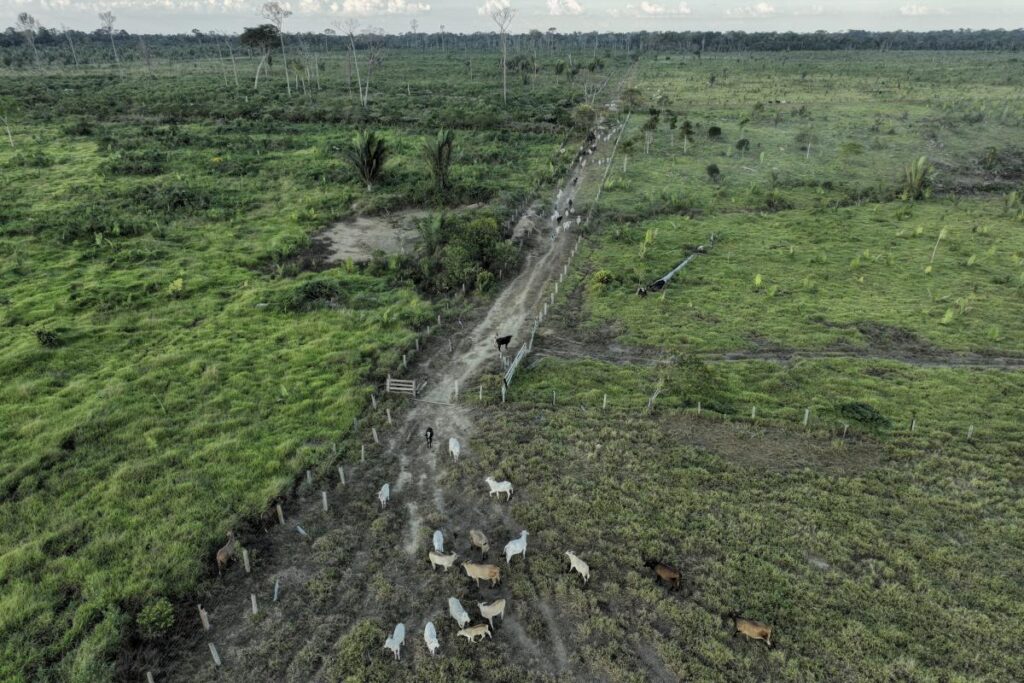The upcoming United Nations climate conference, COP30, is set to take place in Belem, the capital of the Amazon region in Brazil, an area significantly affected by rampant deforestation primarily attributed to cattle farming. This transformation has led to the rainforest shifting from serving as a critical carbon sink to becoming a contributor to carbon emissions. A recent report by the environmental nonprofit Global Canopy reveals alarming statistics: approximately 80% of Brazil’s prominent beef and cow leather companies, along with their financial backers, have not made definitive pledges to cease deforestation practices. This report brings to light the influential beef and leather producers in Brazil, as well as the financial institutions that have backed them with a staggering $100 billion—a figure that represents one-third of the annual financial assistance wealthy nations promised to offer in climate financing at the previous COP29 held in Azerbaijan.
The Global Canopy report underscores the pivotal role that cattle plays in exacerbating deforestation and greenhouse gas emissions. Despite the growing urgency for corporations and financial institutions involved in Brazilian beef supply chains to take action, the findings reflect a troubling lack of progress. For instance, JBS—the largest meat processing company in Brazil—has made commitments to halt deforestation; however, it has also been identified as the most likely entity to be sourcing cattle and leather products from lands that have recently undergone deforestation. This contention stems from the methodology employed by Do Pasto ao Prato, a Brazilian consumer advocacy app that rates deforestation risk based on the purchase information of cattle from various ranchers and the corresponding deforestation rates in those municipalities.
Emma Thomson, one of the study’s coauthors, emphasized that while making deforestation commitments is essential, it is only the initial step toward effecting real change. For meaningful progress, these commitments need to be backed by diligent implementation, monitoring of suppliers and their compliance with sustainability standards, and effective traceability processes to ensure transparency in reporting actual advancements. Apart from JBS, other companies such as Mercurio, Mafrinorte, and Frigol were also identified as likely consumers of cattle sourced from recently deforested lands, raising additional concerns about the broader supply chain’s accountability.
In response to the report, JBS criticized the assessment’s methodology, labeling it overly simplistic and inaccurate while discounting key corporate sustainability efforts. The company contended that it has established systems since 2009 to ensure their suppliers adhere to socio-environmental criteria. According to JBS, the transparency efforts of companies that have made significant strides in sustainable practices often lead to criticism rather than incentives for improvement. Unfortunately, Mercurio, Mafrinorte, and Frigol did not respond to inquiries regarding their positions on the report.
The state of Pará, home to Brazil’s second-largest cattle herd, faces critical environmental challenges, with nearly 35% of its land cleared. This deforestation pattern has pushed Pará to the forefront of greenhouse gas emissions among Brazilian states. Research published in the journal Nature highlights that the eastern Amazon, where this state is situated, has succumbed to deforestation and climate change to the extent that it has lost its ability to function as a carbon sink, a critical element in combating global warming.
As COP30 approaches, Global Canopy’s executive director, Niki Mardas, stated that an update to the report will be released ahead of the conference, indicating that the issue continues to evolve. The forthcoming assessment aims to galvanize action, calling for transformative measures to address the unacceptable levels of deforestation linked to the cattle industry in Brazil. This situation serves as both a warning and a challenge for stakeholders and policymakers—a pressing reminder that the Amazon’s health is intrinsically linked to global climate stability and that robust, effective action is necessary to safeguard this vital ecosystem.

